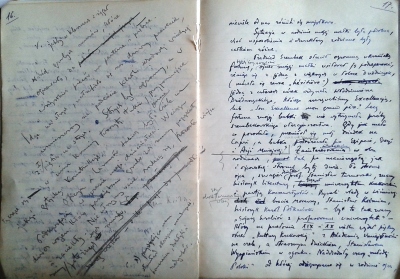![Pamiętnik [Memoir]](/upload/thumb/2022/11/pamietnik_okladka_auto_800x900.jpg)
![Pamiętnik [Memoir]](/upload/thumb/2022/11/pamietnik_okladka_auto_400x500.jpg)
Pamiętnik [Memoir]
ZYGMUNT MYCIELSKI, Pamiętnik [Memoir], manuscript, Zygmunt Mycielski Archive, National Library, No. III 14360.
Preserved in Zygmunt Mycielski’s archives, Pamiętnik [Memoir] is not dated, but seems to have been written in the early 1950s at the latest. Michał Klubiński, author of the Zygmunt Mycielski Archive catalogue, dates it to 1945–1950 (Katalog Rękopisów Biblioteki Narodowej, vol. 24, Archiwum Zygmunta Mycielskiego, ed. Michał Klubiński, National Library, Warsaw 2017). The surviving documents suggest that the composer wrote Memoir with its publication in mind. He abandoned the work, however, realising that publication in the form intended by him would not be possible. This is evidenced by two documents attached to the Memoir. The first is a written opinion addressed to Stefan Żółkiewski, in 1954–1956 head of the culture department of the Central Committee of the Polish United Workers’ Party. Its author (illegible surname) formulates a number of accusations against Mycielski’s Memoir, especially with regard to descriptions relating to the First World War. The second document is a record of Mycielski’s short response to an opinion by a “party colleague”, in which he states unequivocally that “it’s not worth writing a memoir”. Below are the contents of both documents.
I think that a memoir that will pass to the archives of the National Library and that is written by an outstanding individual can be, as a document, completely uncritical.
But if it is to be published, it must give the truth. That is, it can give an idea of the origins of the war, an idea that is erroneous but characteristic of the author in his childhood. Only an adult memoir writer should critically assess his own authentic judgements from his childhood. This is demanded by social morality. All the more so given that your historical judgement will be supported by the great authority of your name – a leading creator and activist of art. A good memoir is apparently a literary genre dedicated to personal experiences. The origins of a war is a scholarly problem. It if is introduced into a memoir, it must be bound by the rules of a historical treatise. Thus memoirs can and should be written. The conditions proposed by that comrade would have raised the value, if it had been preserved.
[illegible signature]
I once began writing a memoir – having reached 1914, I wrote about what I heard about the origins of this war as a child and what I thought about it myself – and what I think.
When I sent it to a friend who was a party member – he lashed out against me for presenting the matter falsely. That the origins were different etc.
Can we write about 1914–18 only from “true” perspectives? But then why write at all? (I wrote what I thought about it, heard about it and think about it). I can read about the Marxist origins of this in an “official” study – therefore, it is not worth writing a memoir!
ZMycielski




